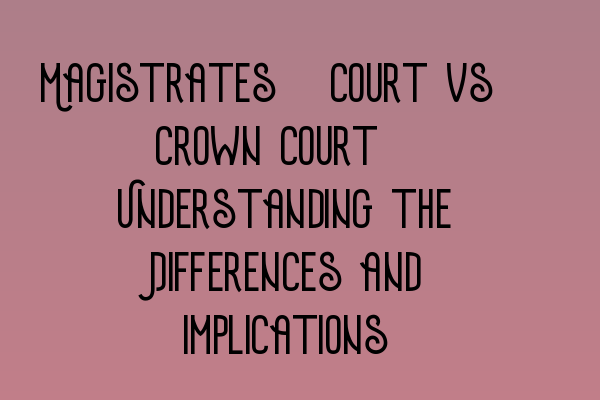Magistrates’ Court vs. Crown Court: Understanding the Differences and Implications
The legal system in the United Kingdom consists of various courts that handle different types of cases. Two key courts that individuals may encounter are the Magistrates’ Court and the Crown Court. Understanding the differences between these courts and their implications is crucial, especially for individuals involved in criminal law cases. In this article, we will explore these differences and shed light on the implications for the parties involved.
Magistrates’ Court
The Magistrates’ Court is primarily responsible for handling low-level or less serious criminal offenses. It consists of a panel of volunteer magistrates or a district judge who oversees the proceedings. The court operates in a summary procedure format, meaning that cases are resolved relatively quickly, usually within a few hours or days. This court has limited sentencing powers, with the ability to impose fines, community orders, or short custodial sentences.
Cases that are typically heard in the Magistrates’ Court include minor theft, public order offenses, traffic offenses, and some lower-level assaults. The court’s aim is to provide a swift and cost-effective resolution to these cases, enabling the efficient administration of justice.
Crown Court
Unlike the Magistrates’ Court, the Crown Court deals with more serious criminal offenses. It consists of a judge and a jury, providing a higher level of judicial scrutiny and due process. The Crown Court handles indictable offenses, which include crimes such as murder, rape, robbery, and complex fraud cases.
The Crown Court, being a higher court, has greater sentencing powers compared to the Magistrates’ Court. It can impose longer custodial sentences, life imprisonment, and other serious penalties. The court also conducts trials, allowing both the prosecution and the defense to present their cases and cross-examine witnesses.
Differences and Implications
There are several key differences and implications when it comes to cases being heard in either the Magistrates’ Court or the Crown Court. Understanding these differences is essential for individuals involved in criminal law cases to make informed decisions about legal representation and the nature of the trial process.
- Severity of Cases: The Magistrates’ Court primarily handles less serious offenses, while the Crown Court deals with more serious and complex criminal cases. This distinction influences the level of legal representation needed and the potential consequences for the accused.
- Legal Representation: In the Magistrates’ Court, individuals can choose to be represented by a solicitor or present their own case. However, in the Crown Court, legal representation by a barrister is typically advised due to the complexity of the cases and the potential severity of the sentences.
- Trial Process: The Magistrates’ Court conducts summary trials, which are often quicker and less formal. On the other hand, the Crown Court holds more elaborate trials, including the selection of a jury and the examination of evidence in greater depth.
- Sentencing Powers: The Magistrates’ Court has limited sentencing powers, while the Crown Court can impose more substantial penalties, including longer custodial sentences and life imprisonment for the most serious offenses.
It is crucial for individuals involved in criminal law cases to consult with an experienced solicitor who can guide them through the legal process and provide appropriate legal representation. Click here for expert advice on legal representation for Delaware LLCs in the UK.
In conclusion, understanding the differences and implications between the Magistrates’ Court and the Crown Court is vital for anyone involved in criminal law cases. The severity of the offense, the need for legal representation, the trial process, and the potential sentencing powers all vary between these courts. By seeking professional advice and proper representation, individuals can navigate the legal system more effectively and increase their chances of achieving a fair outcome.
